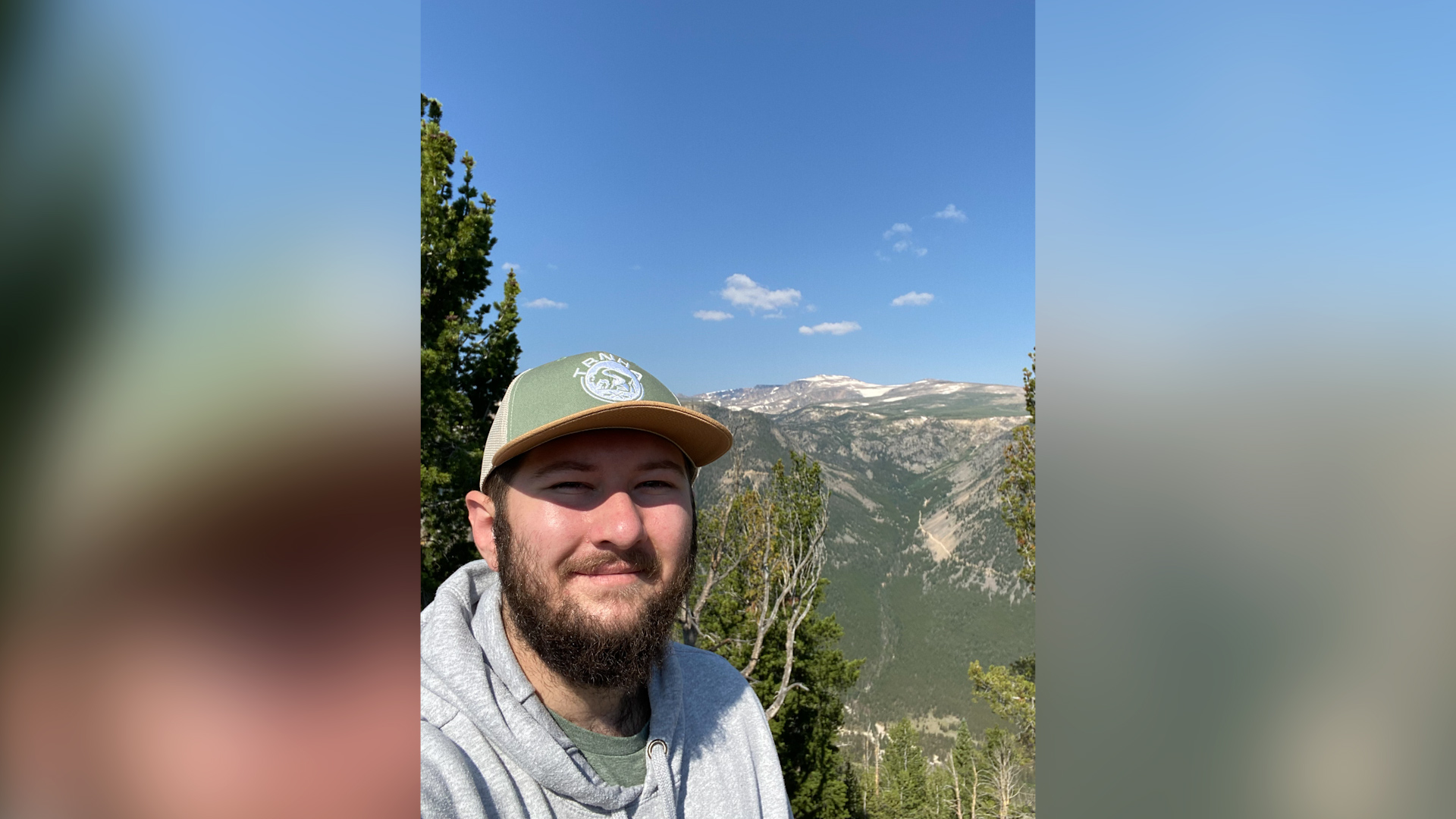
Jacob Chitwood graduated with a BS in forestry in 2024. He recently worked at the Theodore Roosevelt Nature and History Association in the Theodore Roosevelt National Park in North Dakota. For episode 35 of the Step Outside series, he shares his experience and advice for other students seeking careers in outdoor recreation. You can watch the video below or on our YouTube channel.
Transcript of questions and answers:
Would you say that the skills you learned here at the School of Natural Resources helped you in that position?
I worked for the Theodore Roosevelt Nature and History Association. It’s a nonprofit based through the national park. I was staffed inside their two visitor centers and was tasked with giving information to visitors about the town, the park itself, things to do in the town or the park, closest other recreation areas in the nearby area, and I would say definitely the skills I learned through my classes before Dr. Sharp appeared and after have definitely helped me a lot. It helped me very easily acclimate to the system of operation in the national park. It was something completely new to me, but it made it very easy because I had a pretty decent understanding of how lines of communication between different levels within the park worked from superintendent to chief of interp, chief of law enforcement, chief of fee collection, and then from them to my boss at the nature and history association and then back down to me.
What made you want to kind of get into wildland recreation or outdoor recreation?
I grew up in rural Eastern Tennessee on the Cumberland Plateau, and most of my younger life I spent being outside and engaging in wildland recreation. My childhood home is on the back end of a national river and recreation area, and most of my time was spent exploring and actually going out and participating in recreation programs given by the park such as their junior ranger program or just guided hikes, campfire talks, if I was camping in a campground there, and throughout my time growing up there, I realized that that is something I wanted to do. I really liked the idea of being able to go out amongst anywhere in the country and work in these beautiful places and teach people about that place and give them an opportunity to have their own experiences in those beautiful places.
What are you doing right now in Tennessee?
When I got back from that summer position, I went to my town’s mayor at the request of a few of my friends there, and I applied to be their forestry and wildlife specialist so I’m under their community and events planner, and I’m helping further develop the recreational opportunities in the town. It is something that hasn’t really been done even though there is a national park right there as well as a bunch of other for-profit recreation opportunities, so they wanted to have somebody come in with a pretty good grasp of how to capitalize on those opportunities and do them well. She has given me the opportunity to go into the town city park and completely revamp it. I’m going in, helping create literature such as nature guides, hiking guides. I’m actually developing two new hiking trails in the city park itself as well as helping in other projects in the town. Currently, we are working toward a rails to trail program. There’s been a section of rail line through the county that has been abandoned, and they’re trying to convert that into a kind of distance through hike trail, and I’m helping on the back end of that as well.
You may have mentioned this earlier. Which town?
Oneida. Sorry. A very small town in East Tennessee.
Yes. I know Oneida, and why do you think the work that you’re doing is so important?
I think it’s important because no matter what people want to have leisure time. People want to have somewhere they can go to experience either serenity, calmness, go explore, or go strengthen knowledge, skills they’ve learned in other places such as here in the School of Natural Resources. Say you’re taking a birding class, and somebody comes home from the weekend, from campus. They want to go out into those places, use that as a study opportunity, so I think there are many different facets that recreation can be put through where people, whether they realize it or not, are using recreation services so I think it is very important to have people be able to meet those people at the area and kind of help guide them and help them discover what they want out of an area recreation-wise.
Dr. Sharp mentioned that you might be going back to work at Theodore Roosevelt. It’s not the national park.
The nature and history association.
Yes.
Actually, I will be going as a ranger now so that is what I wanted for my career, and I used my knowledge while there and working under the nature and history association to better learn how I can transition from that position to an actual ranger position, and I will be returning there this summer as a ranger.
That’s great news compared to the other news that we’ve been getting recently out of national parks, so that’s good to know. What advice would you give to other students? As you know, the wildland recreation concentration has been renamed to the outdoor recreation and park management concentration. What advice would you give them?
Take every opportunity you can in your classes to learn the names of people that come talk in your class, go to your professors and ask for contacts in certain areas. Before I went to North Dakota and worked for Theodore Roosevelt National Park, I worked for Tennessee State Parks, and the only reason I could do that is because of opportunities given to me through either clubs or classes. People speaking in classes, learning contacts and learning how to apply for those positions, what kind of experience do I need to focus on when I go into that position and focus very hard on your classes. I took the approach of I wanted all my classes to be very practical. I wanted them to directly correlate to what I would be doing in the field so it would make my transition from student to career as easy as possible.
As far as your current position, I’m assuming you’re going to hold that, or is that going to remain something that you can come back to?
I worked it out with the mayor. She does realize that I do want to travel with this career opportunity and see as many places as I can so it will be something I can come back to, or if there is a meeting while I am out traveling somewhere, kind of somewhat as a consultant I should say, just hop in on meetings and provide information when I can. I’ve kind of worked it out to where I have a base I can return back to once I’m done traveling for the summer and then will return home.
Would you say that’s probably an opportunity people don’t necessarily think about that probably other towns are like that too?
Yes, especially in Appalachia. In the Southeast, there are a lot of small towns that have recreation opportunities that are very underutilized whether that be funding or lack of knowledge of how to capitalize on those opportunities so I think a lot of people or a lot of students I should say could find opportunities in those small areas, and it is a great base to learn experience. You can work up in that area. You can kind of learn the area, and while it may not be traveling like how most people when they think of this job going out to these places, you can stay close to home and find opportunities anywhere. Actually, I myself didn’t even expect to get that opportunity in Oneida. If it were not for the push of some friends, I wouldn’t have even tried so no matter what at least try, ask, apply for things. Go ask questions to community leaders, people over recreation areas, what you can do to get into work for them, work around them, work with them. That is another thing I learned with my time with Dr. Sharp is communication between entities. Throughout most recreation spaces, it is a web of teamwork. Not one entity can do it. There are a lot of memorandums of understanding, MOUs, or just you know beneficial programs that they do for each other. That is very prevalent where I’m from. Examples being Pickett State Forest, and its close relation to the state park beside it, and the national park that it is landlocked by so there’s a lot of opportunities to find an entity in an area where you wouldn’t think possible.
